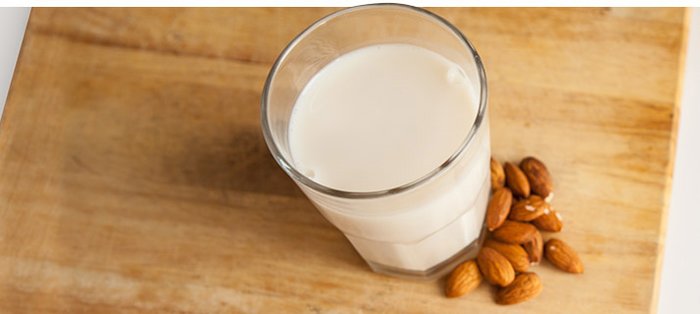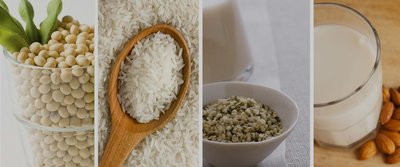Navigating the dairy aisle has never been more confusing. Not long ago, the only choices you had to make about milk were related to its fat content: skim, 1%, 2%, or whole? But now, shelves are lined with a variety of milk alternatives made from nuts, seeds, and beans that also promise to do your body good. Whether you're lactose intolerant, vegetarian, vegan, or simply in search of a little dietary variety, these "milks" can offer a viable option to float your morning cereal.
But before you flaunt your white moustache made from almonds, you should understand the nutritional nuances of each type of milk. Let's start by taking a closer look at the milky macros, and then I'll dive into the of the pros and cons of today's main milk varieties. You may find some of the alternatives aren't all that refreshing!
Milks and Their Macros
Milk, skim
- Calories: 83
- Protein: 8 g
- Carbs: 13 g
- Sugars: 13 g
- Fat: 0 g
- Saturated fat: 0 g
Milk, 1%
- Calories: 102
- Protein: 8 g
- Carbs: 13 g
- Sugars: 13 g
- Fat: 2 g
- Saturated fat: 1.5 g
Milk, 2%
- Calories: 122
- Protein: 8 g
- Carbs: 12 g
- Sugars: 12 g
- Fat: 5 g
- Saturated fat: 3 g
Soymilk, original
- Calories: 110
- Protein: 8 g
- Carbs: 9 g
- Sugars: 6 g
- Fat: 4.5 g
- Saturated fat: 0.5 g
Soymilk, vanilla
- Calories: 100
- Protein: 6 g
- Carbs: 10 g
- Sugars: 8 g
- Fat: 3.5 g
- Saturated fat: 0.5 g
Cashew, original
- Calories: 60
- Protein: 1 g
- Carbs: 9 g
- Sugars: 7 g
- Fat: 2.5 g
- Saturated fat: 0 g
Cashew, unsweetened
- Calories: 25
- Protein: 1 g
- Carbs: 0 g
- Sugars: 1 g
- Fat: 2 g
- Saturated fat: 0 g
Coconut milk beverage, original
- Calories: 70
- Protein: 0 g
- Carbs: 8 g
- Sugars: 7 g
- Fat: 4.5 g
- Saturated fat: 4 g
Coconut milk beverage, vanilla
- Calories: 80
- Protein: 0 g
- Carbs: 10 g
- Sugars: 8 g
- Fat: 4.5 g
- Saturated fat: 4 g
Almond, original
- Calories: 60
- Protein: 1 g
- Carbs: 8 g
- Sugars: 7 g
- Fat: 2.5 g
- Saturated fat: 0 g
Almond, unsweetened
- Calories: 30
- Protein: 1 g
- Carbs: 1 g
- Sugars: 0 g
- Fat: 2.5 g
- Saturated fat: 0 g
Almond, vanilla
- Calories: 90
- Protein: 1 g
- Carbs: 16 g
- Sugars: 16 g
- Fat: 2.5 g
- Saturated fat: 0 g
Hemp, original
- Calories: 80
- Protein: 2 g
- Carbs: 7 g
- Sugars: 6 g
- Fat: 5 g
- Saturated fat: 0.5 g
Hemp, unsweetened
- Calories: 60
- Protein: 2 g
- Carbs: 1 g
- Sugars: 0 g
- Fat: 5 g
- Saturated fat: 0.5 g
Rice, original
- Calories: 120
- Protein: 1 g
- Carbs: 23 g
- Sugars: 10 g
- Fat: 2.5 g
- Saturated fat: 0 g
Rice, unsweetened
- Calories: 70
- Protein: 0 g
- Carbs: 11 g
- Sugars: 1 g
- Fat: 2.5 g
- Saturated fat: 0 g
Rice, vanilla
- Calories: 130
- Protein: 1 g
- Carbs: 26 g
- Sugars: 12 g
- Fat: 2.5 g
- Saturated fat: 0 g
1. Almond Milk
This dairy-free liquid is made from skinned almonds that are ground finely with water and then filtered to remove solids. It's one of the least-expensive milk options, and its mild nutty taste can enhance post-workout shakes, a bowl of cereal, pureed soups, or even a batch of protein muffins.

{{caption}}
Pros
Almond milk is free of saturated fat and appealing to calorie-conscious consumers for its low energy count (30-60 calories per cup for unsweetened or original). It's also typically high in vitamin E, both from what's naturally present in almonds as well as what's added by manufacturers.
Acting as an antioxidant to help lessen oxidative damage in the body, higher intakes of vitamin E may help improve brain function and muscle recovery in those who train hard.
Cons
As with most other nondairy drinks, almond milk typically contains emulsifiers such as carrageenan, a polysaccharide extracted from seaweed, which are added during the manufacturing process to keep ingredients from separating and improve texture.
However, research suggests that these ingredients might not be so benign: A recent study conducted by researchers at Georgia State University found that emulsifiers have the potential to disrupt the composition of healthy bacteria in the gut, which could contribute to inflammation and weight gain in the long run.1 It's important to note that this study was performed in mice, suggesting more research is needed to determine if consumption of emulsifiers like gums and carrageenan would have the same impact in humans.
Additionally, it's currently unknown how much you'd have to consume to potentially sour your health and six-pack, so there's nothing conclusive to this particular con.
2. Soy Milk
The granddaddy of milks in disguise, soymilk was the first nondairy milk to become mainstream, and it's still perhaps the most controversial. It's produced by soaking, crushing, and cooking soybeans, and then extracting the liquid. Mercifully, manufacturers have worked to greatly improve the once overly "beany" and chalky texture that used to plague its taste.

{{caption}}
Pros
Of all the nondairy alternatives, soy reigns supreme in protein. Each cup delivers protein levels nearly on par with regular milk, or 6-8 grams per cup. This can make soy milk more satiating than others with significantly less protein.
While soy protein does not promote the building of muscle as effectively as whey does—mainly because of lower levels of the anabolic amino acid leucine—it can still help you meet overall protein needs for the promotion of lean body mass.2 Soy milk is also a source of potassium, which is necessary for muscle function and keeping your blood pressure numbers from simmering over.
Cons
Muscle men have long worried about consuming too many processed soy products because of their possible estrogen-mimicking effects. There might be some justification for this concern. Scientists at the University of Connecticut discovered that men who supplemented with soy protein for two weeks experienced a blunted rise in blood-testosterone levels in response to resistance training, compared to consuming the same amount of dairy-derived whey protein.3 So if you want to maximize your testosterone to help build muscle like a pro, keep your soy-milk intake in check.
Some brands also add cheap oils that can unnecessarily drive up total calories. Also, if you've ever played music from your backside after guzzling a glass of soy milk, it's because a group of digestion-resistant carbohydrates in soy called oligosaccharides are noshed on by bacteria in your gut and produce gassy side effects.
Since most of the soy grown in America is genetically modified, you'll have to splurge for organic if you're concerned about GMO food.
3. Cashew milk
Among the newest additions to the nondairy-beverage line-up, this one actually comes closest to matching the creamy texture of ye olde moo juice.

{{caption}}
Pros
Cashew milk is often fortified with a range of useful nutrients such as calcium, vitamin D, vitamin B-12, and zinc. Zinc plays a role in thousands of different enzymatic reactions in the human body, including those involved in testosterone production. However, there remains a question about how well the body absorbs vitamins and minerals added to dairy-free milks compared to what's naturally present in foods such as the calcium found in authentic milk.
Cons
Both the original and unsweetened versions of cashew milk have few calories per cup—60 and 25, respectively—which can be useful for people who are watching their calorie intake as part of a weight-loss or get-shredded eating plan.
But the low calorie count of cashew and other nut or seed milks speaks to the fact that you're essentially paying for a watered-down product. A cup of whole cashews contains nearly 800 calories, so to get a glass of cashew milk down to 25 calories, manufacturers skew the nut-to-water ratio greatly toward the latter.
The upshot is that you shouldn't expect to obtain nearly the levels or range of naturally occurring nutrients found in whole nuts or seeds when you drink these products.
4. Hemp milk
This groovy beverage is made by blending hemp seeds with water to produce a drink with a distinctive earthy-nutty flavor that can take a little bit of getting used to. Rest assured that imbibing hemp milk won't cause you to fail a drug test—it contains virtually none of the psychoactive ingredient THC found in marijuana. That's why it's legal for sale even in states where marijuana is not legalized.

{{caption}}
Pros
Hemp milk delivers higher levels of omega-3 fat than other nondairy drinks. While the omega-3s present in fatty fish like salmon are more potent, plant-sourced omega-3 fats such as those in hemp can also work to improve the health of your ticker. This also makes hemp milk a good option for vegans looking for non-meat sources of omega-3 fatty acids.
Hemp milk is also a dietary source of iron, which is absent in cow's milk. Required for delivering oxygen to muscles and brain cells, iron is necessary to keep your energy levels up on the gym floor and prevent brain fog. Unlike soy, hemp is never genetically modified, and it's an option for those who need to avoid common allergens like nuts, dairy, soy, or gluten.
Cons
A major pitfall of nondairy milks like hemp is that they can be weighed down by added sugars, including rice syrup and cane sugar. This is in contrast to the naturally occurring sugar (lactose) present in true milk. And this added sweet stuff could put your six-pack on ice.
Several studies have found a positive association between greater intakes of sugar-sweetened beverages and weight gain and obesity in both children and adults.4,5 So strike back by opting only for cartons labelled "unsweetened" for a purer product. Even drinks labelled "original" can include added sweeteners.
While whole hemp seeds are an excellent source of complete plant-based protein, hemp milk like most of the others here is slim on protein. It supplies 75 percent less than that found in the liquid squirted from udders.
5. Coconut milk
Carton or shelf-stable Tetra Pak coconut milk is gleaned by blending together filtered water and the coconut liquid squeezed from grated coconut flesh. It's designed to have a mouth-feel closer to low-fat dairy milk than its richer canned counterpart, which is much harder to gulp from a glass. It can add a taste of the tropics to oatmeal, soups, smoothies, and pancakes.

{{caption}}
Pros
Bisphenol-A (BPA)
Bisphenol-A (BPA) is a chemical that lines the inside of many food cans and has been linked to heart disease and fat gain with high exposure.
I wouldn't start throwing away all of your cans quite yet, though, since a majority of these findings have only been shown in animal models. More research needs to be done to determine the effects of BPA in the human body.
Compared to full-fat canned coconut milk, the beverage version has about 365 fewer calories and 43 fewer grams of fat for each one-cup serving. Choosing the carton over the can is also a way to reduce your exposure to bisphenol-A (BPA).
The unique medium-chain-fatty acids (MCFAs) found in coconut are thought to increase metabolism, but their impact on tangible fat loss remains controversial.
Cons
Like many of its moo-free brethren, the lack of protein in coconut milk means it's anything but muscle food. So if you're giving up milk in favor of nondairy milks like coconut or almond, you need to make sure you're obtaining enough muscle-friendly protein from other sources in your diet.
The lack of protein also makes these milks less filling, so even though they often contain fewer calories than traditional milk, they may leave you feeling more famished and, in turn, sourcing out extra calories elsewhere.
What's more, while coconut meat itself is a fantastic source of fat-fighting dietary fiber, the beverage it produces is not.
6. Rice milk
This milk alternative is made by blending together cooked rice with water and then adding enzymes to convert starches to sugars. Rice milk's sweet undertones and smooth texture make it a popular nondairy option for coffee, smoothies, and desserts.

{{caption}}
Pros
Since rice is considered hypoallergenic, the drink it produces is a safe option for those with food sensitivities to dairy, nuts, or soy. As with other nondairy alternatives, rice milk is now often fortified with calcium and vitamin D to help maintain strong bones. But be sure to give the container a very good shake to help redistribute any added vitamins and minerals.
Cons
Those who are watching their carbohydrate intake should note that rice milk tends to have higher levels of carbs than other types of milk. Depending on where it's grown, rice can contain concerning amounts of arsenic, a chemical linked to health concerns such as heightened cancer and heart-disease risk.8
Although the use of arsenic-contaminated groundwater for irrigation of crops has only been reported in Southeast Asia, it's worth noting that some of this arsenic could potentially end up in your glass. A lot more research is needed to determine how much arsenic might be found in popular rice milk brands and whether this possesses a health risk.
The Bottom Line
While you can often find these nondairy milks in natural-food stores and the health-food section of grocers, they shouldn't be considered healthy or "whole foods" in the same way nuts, seeds, vegetables, or even good old-fashioned milk are. While it's OK to consume them in moderation, you shouldn't always guzzle them back with expectations that they're ideal for your fitness goals. Each milk can serve a unique function, but due to the overall lack of protein, we're still willing to cry over real spilled milk!
Nutrition Numbers for Milks
- 2% milk
- 1% milk
- Skim milk
- Soymilk, original
- Soymilk, vanilla
- Cashew, original
- Cashew, unsweetened
- Coconut milk, original
- Almond, original
- Almond, unsweetened
- Almond, vanilla
- Hemp milk, original
- Rice, original
- Rice, unsweetened
- Rice, vanilla
References
- Chassaing, B., Koren, O., Goodrich, J. K., Poole, A. C., Srinivasan, S., Ley, R. E., & Gewirtz, A. T. (2015). Dietary emulsifiers impact the mouse gut microbiota promoting colitis and metabolic syndrome. Nature, 519(7541), 92-96.
- Yang, Y., Churchward-Venne, T. A., Burd, N. A., Breen, L., Tarnopolsky, M. A., & Phillips, S. M. (2012). Myofibrillar protein synthesis following ingestion of soy protein isolate at rest and after resistance exercise in elderly men. Nutrition, Metabolism and Cardiovascular DiseasesNutr Metab (Lond), 9(1), 57.
- Kraemer, W. J., Solomon-Hill, G., Volk, B. M., Kupchak, B. R., Looney, D. P., Dunn-Lewis, C., ... & Volek, J. S. (2013). The effects of soy and whey protein supplementation on acute hormonal responses to resistance exercise in men. Journal of the American College of Nutrition, 32(1), 66-74.
- Malik, V. S., Schulze, M. B., & Hu, F. B. (2006). Intake of sugar-sweetened beverages and weight gain: a systematic review. The American Journal of Clinical Nutrition, 84(2), 274-288.
- Malik, V. S., Pan, A., Willett, W. C., & Hu, F. B. (2013). Sugar-sweetened beverages and weight gain in children and adults: a systematic review and meta-analysis. The American Journal of Clinical Nutrition, 98(4), 1084-1102.
- Ryan, K. K., Haller, A. M., Sorrell, J. E., Woods, S. C., Jandacek, R. J., & Seeley, R. J. (2010). Perinatal exposure to bisphenol-a and the development of metabolic syndrome in CD-1 mice. Endocrinology, 151(6), 2603-2612.
- Melzer, D., Osborne, N. J., Henley, W. E., Cipelli, R., Young, A., Money, C., ... & Galloway, T. S. (2012). Urinary bisphenol A concentration and risk of future coronary artery disease in apparently healthy men and women. Circulation,125(12), 1482-1490.
- Meharg, A. A. (2004). Arsenic in rice–understanding a new disaster for South-East Asia. Trends in Plant Science, 9(9), 415-417.

